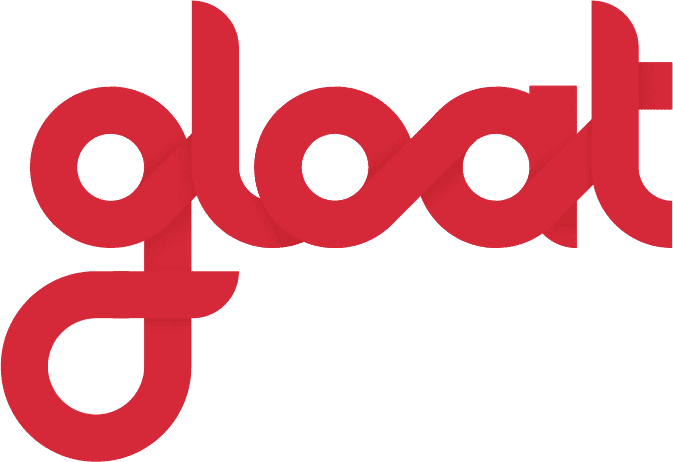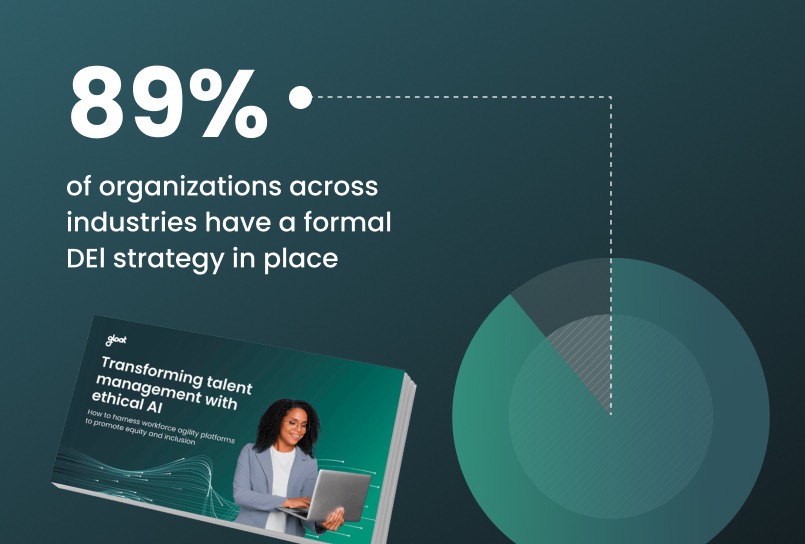How to mitigate bias and break down barriers with a talent marketplace
Find out how talent marketplaces can help you level the playing field

From fears that robots will take our jobs to warnings about the dangers of biased algorithms, it can be challenging to separate AI fact from fiction. Yet, it’s something leaders must navigate, since all signs suggest that AI-powered workplace technology is here to stay. In fact, according to Genesys, 90% of companies now use AI to improve customer experience and 61% of executives expect the share of roles requiring collaboration with AI to increase over the next three years.
When it comes to technology concerns, bias tends to top the list, with 54% of leaders sharing this apprehension. It’s easy to understand why any solution with skewed results would be a major problem, especially as organizations strive to level the playing field. Today, nearly 1 in 2 CEOs view building a diverse, equitable, and inclusive workplace as one of their top priorities.
Fortunately, the newest generation of workplace technology takes bias out of the equation. Talent marketplaces in particular have unparalleled potential to promote equity and inclusivity by democratizing access to career opportunities. So rather than worrying about how your technology might be swaying decisions, you can turn your attention to minimizing human bias—which is something talent marketplaces also help with.
Types of bias in the workplace
There are two main types of bias that employees may encounter in the workplace, including:
Unconscious bias
Unconscious bias, or implicit bias, refers to attitudes or stereotypes that we hold without even realizing it. These ideas can influence our perceptions, attitudes, and behaviors. Without awareness, our unconscious biases can influence key decisions in our workplaces and promote inequality. An example of unconscious bias might be a hiring manager who gravitates toward younger candidates for a digital media role because he or she associates youth with better technology and social media skills.
Conscious bias
In contrast, conscious bias describes views and prejudices we are aware of. With conscious bias, we can control how we let it influence us because we are self-aware enough to know if we have the bias. An example of conscious bias might be a leader who knowingly overlooks women who are up for promotion because they believe these workers won’t make good managers.
The impact of bias on organizations
There are many reasons why leaders should make concerted efforts to minimize bias in their workplaces. Generally, when organizations are inequitable, employees will feel less connected to their companies and search for job opportunities elsewhere so they don’t have to fear that they’ll be discriminated against.
Bias can also put a damper on productivity and innovation because employees with nuanced perspectives and cutting-edge solutions may be overlooked due to preconceived notions about their aptitude and ability. Additionally, a biased workplace leads to both reputational and legal risks as some employees may choose to take action against a company that discriminates against them.
10 steps to combat bias in the workplace
If you’re looking to minimize bias in your workplace, consider the following best practices:
#1. Understand unconscious biases
Some employees may not be familiar with the concept of unconscious bias and how it works. Ultimately, we all have some level of unconscious bias based on our lived experiences and how we were raised. Recognizing that unconscious bias often plays a role in career and talent management decisions is the first step you can take to mitigate it.
#2. Identify personal bias triggers
Take a step back and reflect on where your own unconscious biases may lie. Take an assessment—such as Harvard’s popular Implicit Association Test—to figure out which of your perceptions are most likely to be governed by unconscious biases. Armed with this information, you can proactively take steps to address them.
#3. Analyze how bias impacts your organization
Biases often impact hiring and staffing decisions, such as who’s getting promoted and who deserves a raise. Perform an internal analysis of touch points across the employee lifecycle to identify areas where workers may be more vulnerable to biases from their colleagues. Once you understand where bias is most likely to creep in, you can take action to prevent these preconceptions from skewing hiring decisions.
#4. Provide bias awareness training
Bias trainings are an organizational strategy that HR teams can roll out for employees across the company. As a crucial aspect of learning and development programs, these trainings can help align company-wide initiatives to create a more inclusive workplace and empower employees to reduce bias in their own day-to-day lives.
#5. Revamp hiring practices
Some companies may need to make big changes to ensure unconscious bias doesn’t impact their hiring decisions. For example, studies show that the wording in job descriptions can discourage women from applying for certain roles. Rework job descriptions to be more inclusive so you can draw from wider talent pools. Standardizing your interview process can also help make talent acquisition decisions more equitable.
#6. Use data-driven decision-making
Data should be a factor in all decision-making processes—and hiring and talent management are not exceptions. Set measurable goals around your diversity, equity, and inclusion initiatives and harness data to make sure you’re on the right track.
#7. Incorporate diversity in recruitment
If you want to create a diverse workforce, make sure there’s diversity among the group of people tasked with hiring new employees. Otherwise, you may continue hiring the same kinds of people, despite your best intentions. Watch out for prioritizing a culture fit during your hiring process because this thought pattern can lead managers to hire people with similar characteristics and backgrounds, in turn limiting diversity within your organization.
#8. Promote open discussion on bias
Employees shouldn’t feel like they have to stay quiet about any workplace biases they encounter. Instead, create a culture that encourages open dialogues by establishing psychological safety for employees. People should feel confident that they won’t be punished or humiliated for speaking up so they won’t be afraid to set the record straight.
#9. Enforce accountability measures
In addition to protecting employees who are discriminated against, leaders should take action to ensure any offenders understand the impact they have on their colleagues and their work environment. Make sure to involve HR and document the incident so that managers have it on record. Give employees who were harmed by the discriminatory behavior the chance to speak with the offender but avoid pushing them to confront them.
#10. Establish DEI goals and metrics
Rather than merely talking about DEI, set concrete goals to inspire your workforce to put these ideas into action. Consider creating a Diversity, Equity, Inclusion, and Belonging (DEIB) policy that outlines your company’s commitment to ensure a supportive, fair, and inclusive work environment for all.
4 ways that talent marketplaces mitigate bias
The best talent marketplaces are designed to mitigate bias and ensure that employees have equal access to career development opportunities. When it comes to evaluating your platform’s potential to break down barriers, here are a few differentiators to look out for:
#1. Multi-matching strategies
As mentioned above, multi-matching strategies are a must for talent marketplaces. Rather than just using one recommendation model to identify employees whose skills and experience align with a specific opportunity, your talent marketplace should employ additional matching strategies that look for potentially suitable employees with a different profile type. That way, your platform is intrinsically promoting the diversity of candidates as a result of its design by avoiding the over-recommendation of a single profile type.
#2. Exploring candidates outside of targets
The best talent marketplaces take diversifying your candidate slate to the next level. As the system tries out different matching strategies, it will recommend candidates that the original matching models would not target. By studying how hiring managers react to these “unlikely” candidates, your platform will keep discovering new meaningful attributes and profile types that were not covered before.
#3. A commitment to transparency and D&I
Like any type of ethical AI, your talent marketplace should adhere to well-defined guidelines that spell out whether data is being used in a moral way. The most impactful guidelines will include transparency as a principle, ensuring their systems provide context so leaders can understand why internal candidates have been selected as potential matches. Similarly, diversity and inclusion should be woven into your talent marketplace’s guidelines for ethical AI. The potential for bias and prejudice should be acknowledged and teams should be diverse and inclusive so that a wide array of unique perspectives and experiences are taken into account.
#4. Recommendations, not decisions
The matches that your talent marketplace generates should be viewed as recommendations, rather than final decisions. Suggestions aren’t written in stone; instead, they’re meant to equip leaders with insights and open their eyes to qualified internal talent that may have once been overlooked. Ultimately, it’s up to your stakeholders to ensure that talent management decisions align with your organization’s own standards for equity and inclusivity. Talent marketplaces are just a powerful tool that enables organizations to take their commitment to leveling the playing field one step further.
Impact of AI on workplace bias
When organizations don’t have systems in place to ensure AI usage is ethical, there’s a real risk that workplace technology will cause significant harm, including exacerbating biases or fueling new ones.
There are a few different ways to use AI that might have unethical impacts. Some businesses may leverage platforms that rely on tracking or surveillance to generate insights about employees, which violates privacy and diminishes workplace trust. Other technologies may be plagued by bias, such as facial recognition tools, many of which have significantly higher error rates for women and people of color.
Why a talent marketplace must use ethically constructed AI
All AI-powered technologies must ensure AI adheres to ethical guidelines, and talent marketplaces are no exception. The two-sided platforms include a rich data, insights, and artificial intelligence layer that connects, cleans, and normalizes data and integrates information from disparate platforms and tools to create one harmonized data set.
If the AI that’s powering your talent marketplace isn’t ethical, your platform won’t be democratizing access to opportunities like it’s intended to. For example, if your employees’ personal information (like names and zip codes) is fed into the algorithms that your talent marketplace uses to match people to opportunities, there’s a risk that this information will skew the suggestions it generates. Similarly, if your platform doesn’t use multiple matching strategies to look for other potentially suitable employees with different profiles, qualified talent will get overlooked.
To learn more about what responsible AI usage looks like in action, check out our guide, Transforming talent management with ethical AI.





